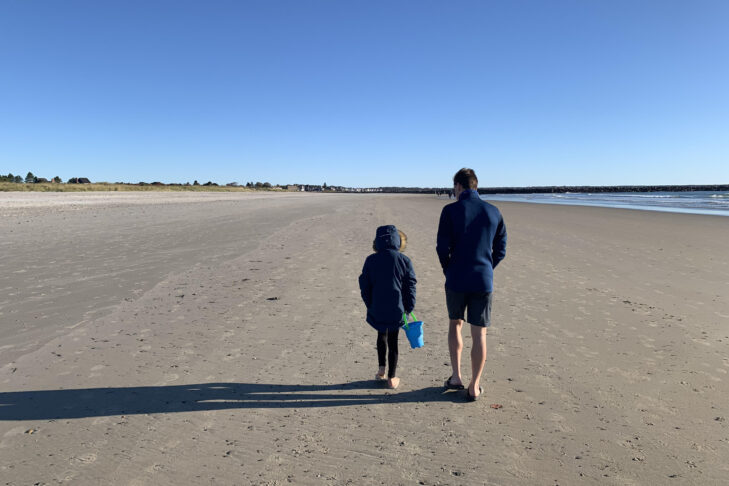“All the rivers flow into the sea, yet the sea is never full/to the place where the rivers flow, there they repeatedly go.”
—Ecclesiastes 1:7
There’s something about walking the beach at daybreak.
Maybe a crab claw washes up, or a clamshell, or if you’re lucky, an undamaged sand dollar. The younger the child, the more gleeful the reaction on finding the remnants of the ocean on the morning sand.
My favorite, though, are the flat, smooth stones, gently massaged by the waves and water over the years, if not centuries, if not millennia, if not eons. There’s something about the impact of time and water on the natural world that has left us with some incredible natural phenomena, from the Grand Canyon, to the Cliffs of Dover, to the limestone grottoes of Rosh Hanikra, to those smooth stones on the beach, glistening in the low rays of dawn and tide.
This past weekend, as we have for the previous 13 years, we spent a few days in Maine with my in-laws. Starting in 2007, on the date of this famous home run, and for every year since, we spend a long weekend on the beach, eating, flying kites, digging holes in the sand, picking apples and carrots, and enjoying glow sticks on the beach at dark. We’ve been going up there for so long that I’m pretty sure none of our five children remember a time when we did not make the trip.
And, in truth, these 14 Octobers have passed by in the blink of an eye.
Our annual fall pilgrimage to the Maine coast also shows the impact of time and nature on our children. The rough edges of my then 4-year-old have now been smoothed into a tall and strapping 12th grader, looking ahead at his future, and going on down the line it’s pretty emotional to come back to the same spot every year and take pictures with the kids (and us, and my wife’s parents) another year older. Facebook is really good at this, popping off reminders each year and showing us a photo on the beach or breakwater with once-babies-now-teens-and-tweens at various stages of development, or times when a new baby was being held, or years upon years of dawn’s shadows on the quiet sand.
I’m certainly not the first to look at the ocean, or children, and think about time and space. Even Kohelet, from the hilltops of Jerusalem, had seen the expanse and wondered about the fullness of the ocean, the futility of mortal life, and the inexplicable interplay of morality and suffering. The Book of Ecclesiastes, which was read during Sukkot, always asks the big questions and prompts an annual reflection about what impact we really have on anything, or anyone. The words of that scroll are always worth reading, and of all our sacred texts, I probably find it the most fascinating.
In truth, the totality of Kohelet’s wisdom is overwhelming, and we will most likely not be able to answer those eternal questions in our generation. The least we can do is find meaning amongst the morning stones and the ebbing tide with our children, hoping they will remember those times as fondly as we do.
After all, the sea may never be full, but our hearts can be.
This post has been contributed by a third party. The opinions, facts and any media content are presented solely by the author, and JewishBoston assumes no responsibility for them. Want to add your voice to the conversation? Publish your own post here. MORE



